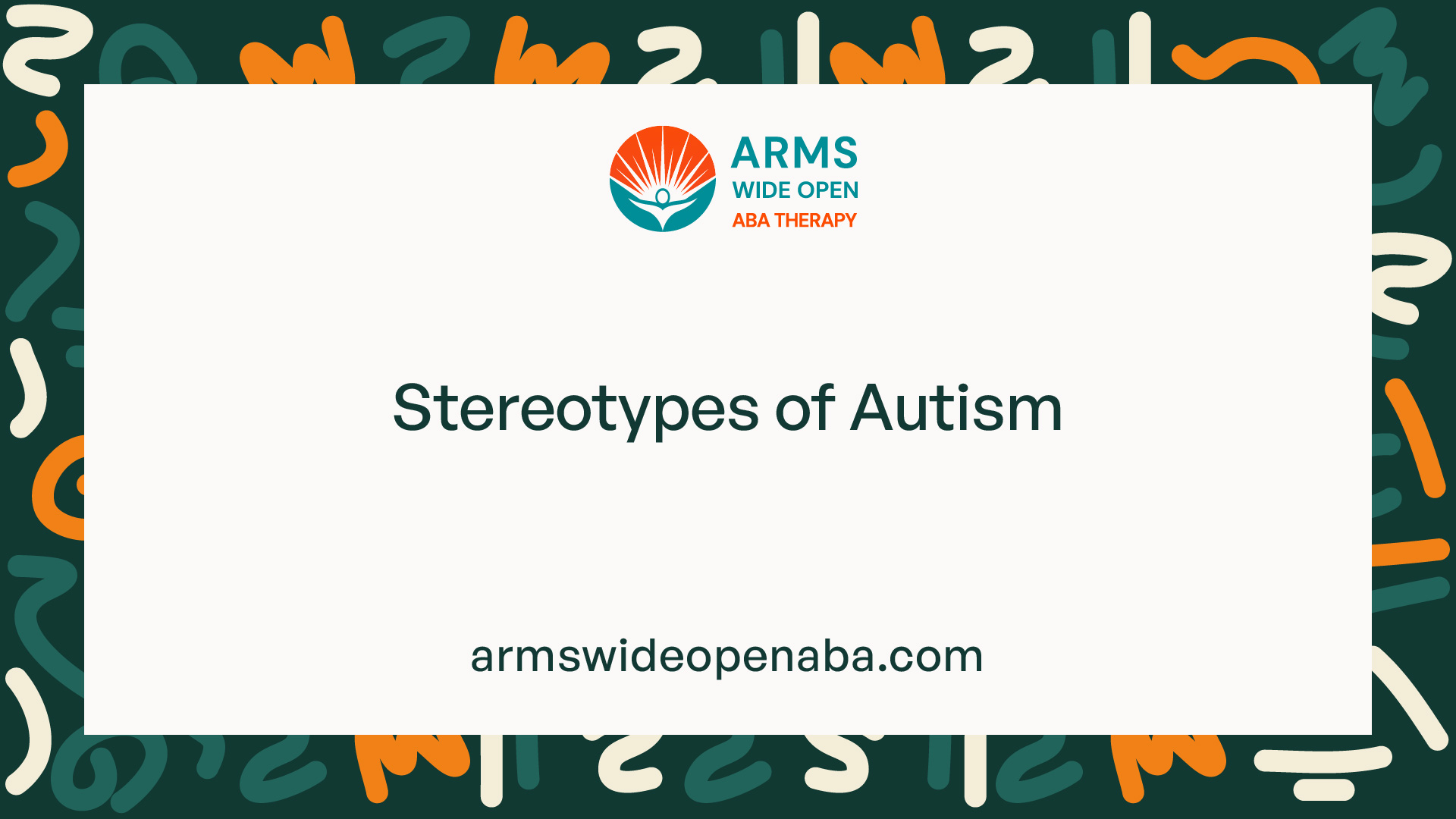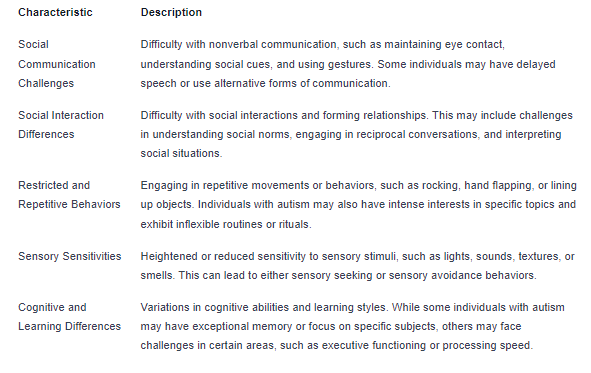Stereotypes of Autism
Break free from stereotypes of autism! Discover the truth behind common misconceptions and embrace the strengths of autistic individuals.

Understanding Autism
To dispel stereotypes of autism, it is crucial to first gain a comprehensive understanding of what autism is and the common characteristics associated with it.

What is Autism?
Autism, also known as Autism Spectrum Disorder (ASD), is a neurodevelopmental disorder that affects individuals in various ways. It is characterized by differences in social communication and interaction, as well as restricted and repetitive patterns of behavior, interests, or activities.
Autism is a spectrum disorder, which means that it manifests differently in each individual. Some individuals with autism may have mild symptoms, while others may have more significant challenges. It is important to recognize that autism is not a disease or a defect, but rather a different way of experiencing the world.
Common Characteristics of Autism
While autism is a complex and diverse condition, there are several common characteristics that are often associated with it. These include:

It is important to note that these characteristics vary from person to person. Every individual with autism is unique, and their experiences and abilities should be respected and celebrated.
By understanding what autism is and the common characteristics associated with it, we can challenge stereotypes and promote a more inclusive and accepting society.
Stereotypes of Autism
Despite increased awareness and understanding of autism, there are still prevalent stereotypes and misconceptions surrounding this neurodevelopmental disorder. Challenging these stereotypes is crucial to fostering a more inclusive and accepting society. Let's explore and dispel some common myths:
Myth 1: All Autistic Individuals are Nonverbal
One of the most pervasive stereotypes is the belief that all individuals with autism are nonverbal. However, this is far from the truth. While some autistic individuals may face challenges with speech and communication, many are fully capable of verbal communication. In fact, the spectrum of communication in autism is vast, ranging from nonverbal to highly articulate individuals.
Myth 2: Autistic Individuals Lack Empathy
Contrary to popular belief, autistic individuals are not devoid of empathy. The misconception stems from differences in emotional expression and social interaction. Autistic individuals may experience and express empathy differently, often displaying intense empathy and compassion towards others. It's important to recognize and appreciate the unique ways in which autistic individuals express empathy.
Myth 3: Autistic Individuals are Socially Withdrawn
While social difficulties are a common characteristic of autism, it is incorrect to assume that all autistic individuals are socially withdrawn. Some individuals with autism may face challenges in social interactions, but many actively seek social connections and engage with others. It is essential to understand that social interaction styles can vary greatly among autistic individuals.
Myth 4: Autistic Individuals are Intellectually Disabled
Another stereotype that needs dispelling is the assumption that all autistic individuals are intellectually disabled. Autism is a spectrum disorder, and intellectual ability varies greatly among individuals. While some autistic individuals may have intellectual disabilities, many have average or above-average intelligence. It's important to recognize and appreciate the diverse strengths and abilities of autistic individuals.
By dispelling these stereotypes and misconceptions, we can promote a more accurate understanding of autism. It is crucial to remember that autism is a complex and diverse condition, and each individual's experience is unique. Embracing this diversity and challenging stereotypes is essential for creating a more inclusive and accepting society.
Dispelling Stereotypes
When it comes to understanding autism, it is essential to dispel the commonly held stereotypes that can perpetuate misconceptions. By challenging these stereotypes, we can gain a more accurate and nuanced understanding of autism and the individuals who are on the autism spectrum. In this section, we will explore the spectrum of communication, emotional intelligence in autism, unique social interaction styles, and the strengths of autistic individuals.
The Spectrum of Communication
Autistic individuals have a diverse range of communication abilities and preferences. While some may have difficulty with verbal communication, it is important to note that not all autistic individuals are nonverbal. In fact, many individuals on the autism spectrum have unique ways of expressing themselves, such as through alternative forms of communication like sign language, augmentative and alternative communication (AAC) devices, or written communication. It is crucial to recognize and respect these different modes of communication to ensure effective and meaningful interaction.
Emotional Intelligence in Autism
Contrary to the stereotype, autistic individuals do experience and express emotions. However, their emotional experiences and expressions may differ from neurotypical individuals. Autistic individuals may have difficulty understanding and interpreting social cues, which can sometimes lead to misunderstandings. Nevertheless, it is important to recognize that autistic individuals have their own unique emotional intelligence and experiences. By fostering empathy and understanding, we can create a more inclusive and supportive environment for autistic individuals to thrive.
Unique Social Interaction Styles
Autistic individuals may approach social interactions in ways that differ from neurotypical individuals. While some autistic individuals may prefer solitude or have difficulty with certain social cues, it is crucial to understand that this does not mean they are socially withdrawn or uninterested in socializing. Autistic individuals may engage in social interactions in their own unique ways, which may involve focusing on specific interests, having intense conversations about their passions, or demonstrating a deep understanding of a particular topic. By embracing and respecting these unique social interaction styles, we can foster meaningful connections with autistic individuals.
Recognizing the Strengths of Autistic Individuals
Autistic individuals possess a wide range of strengths and talents that often go unrecognized due to the prevailing stereotypes surrounding autism. Many autistic individuals have exceptional attention to detail, strong problem-solving abilities, and a remarkable ability to focus on tasks of interest. Additionally, their unique perspectives and ways of thinking can contribute to innovative and creative solutions. By recognizing and valuing these strengths, we can create inclusive environments that celebrate the diverse talents of autistic individuals.
Dispelling stereotypes is crucial for promoting understanding and acceptance of autism. By embracing the spectrum of communication, recognizing emotional intelligence, understanding unique social interaction styles, and appreciating the strengths of autistic individuals, we can foster a more inclusive society that values and supports the diverse experiences of individuals on the autism spectrum.
Promoting Understanding and Acceptance
To dispel the stereotypes surrounding autism, it is crucial to promote understanding and acceptance of autistic individuals. By educating the public, challenging stereotypes through personal stories, creating inclusive environments, and advocating for autistic individuals, we can work towards a more inclusive and compassionate society.
Education and Awareness
Education and awareness play a vital role in breaking down stereotypes and fostering understanding of autism. By providing accurate information about autism, its characteristics, and the diverse experiences of autistic individuals, we can challenge misconceptions and promote empathy. Educational initiatives can be implemented in schools, workplaces, and communities to ensure that people have a comprehensive understanding of autism.
Challenging Stereotypes Through Personal Stories
Personal stories have the power to challenge stereotypes and create a deeper understanding of autism. Sharing narratives of autistic individuals and their unique experiences helps to humanize autism and highlight the diversity within the autistic community. These stories can be shared through various mediums, such as books, documentaries, online platforms, and public speaking engagements, to reach a wide audience and challenge preconceived notions.
Creating Inclusive Environments
Creating inclusive environments is essential for promoting acceptance and understanding of autism. This involves making accommodations and adjustments to ensure that autistic individuals can fully participate and thrive in various settings, such as schools, workplaces, and public spaces. Providing sensory-friendly spaces, implementing inclusive policies, and training staff members on autism awareness and support strategies are important steps towards fostering inclusivity.
Advocacy for Autistic Individuals
Advocacy plays a crucial role in amplifying the voices of autistic individuals and promoting their rights and needs. Advocacy efforts can involve working with policymakers and organizations to implement inclusive policies, supporting initiatives that promote acceptance and understanding, and challenging discriminatory practices. Autistic-led organizations and self-advocacy groups play a vital role in advocating for the rights and well-being of autistic individuals.
By promoting education, challenging stereotypes through personal stories, creating inclusive environments, and advocating for autistic individuals, we can foster a society that embraces and supports the unique strengths and contributions of autistic individuals. It is through these collective efforts that we can dispel stereotypes and create a more inclusive and accepting world for everyone.
FAQs about Stereotypes of Autism
To further dispel stereotypes and misconceptions surrounding autism, let's explore some frequently asked questions:
Q: Are all autistic individuals the same?
A: No. Autism is a spectrum disorder, which means that it affects each individual differently. While there are common characteristics associated with autism, every individual with autism has unique experiences and abilities.
Q: Is autism caused by bad parenting or vaccines?
A: No. These are myths that have been debunked by scientific research. Autism is a neurodevelopmental disorder that is believed to be caused by a combination of genetic and environmental factors.
Q: Can autistic individuals live independently?
A: Yes. Many autistic individuals can live independently with support and accommodations. It is important to recognize that the level of support needed varies among individuals.
Q: Do all autistic individuals have special talents or abilities?
A: No. While some autistic individuals may have exceptional talents or abilities in certain areas, not all do. It is important to recognize and appreciate the diverse strengths and abilities of each individual.
Q: Can autistic individuals have meaningful relationships?
A: Yes. While social difficulties are a common characteristic of autism, many autistic individuals can form meaningful relationships with others. It is important to understand and respect the unique social interaction styles of each individual.
By addressing these frequently asked questions, we can further promote understanding and acceptance of autism and challenge harmful stereotypes and misconceptions.
Conclusion
It is crucial to recognize and challenge the stereotypes and misconceptions surrounding autism. By promoting understanding and acceptance of autistic individuals, we can create a more inclusive society that values diversity and celebrates the unique strengths and abilities of each individual.
It is important to remember that autism is a spectrum disorder, and every individual's experiences and abilities are unique. We must approach each individual with empathy, respect, and an open mind to fully appreciate their diverse perspectives.
Through education, personal storytelling, creating inclusive environments, and advocating for autistic individuals' rights and needs, we can dispel harmful stereotypes and promote a more accepting society. As a community, we can work towards creating a world where everyone is valued for who they are.
Sources
https://www.crossrivertherapy.com/autism/autism-stereotypes
https://www.autismeducationtrust.org.uk/sites/default/files/2021-12/autismmyths.pdf
https://www.ncbi.nlm.nih.gov/pmc/articles/PMC2677582/
Similar articles
We’re here to help you

Our team is here to assist you in this process. Contact us for any assistance.
it’s easy to apply
We Accept Most Insurances
Our in-network insurance partnerships make ABA therapy more accessible to families throughout our service areas.







Our Insurance Process
We'll request your insurance details to help us verify your plan's coverage for ABA therapy. Once we've received this information, we'll walk you through your benefits, including copayments, deductibles and out-of-pocket maximums, so you know what to expect in advance.
Our team will then handle the preauthorization and all the necessary paperwork.
.svg)





















.jpeg)


































.jpeg)




.jpeg)







.jpeg)











.jpeg)
















